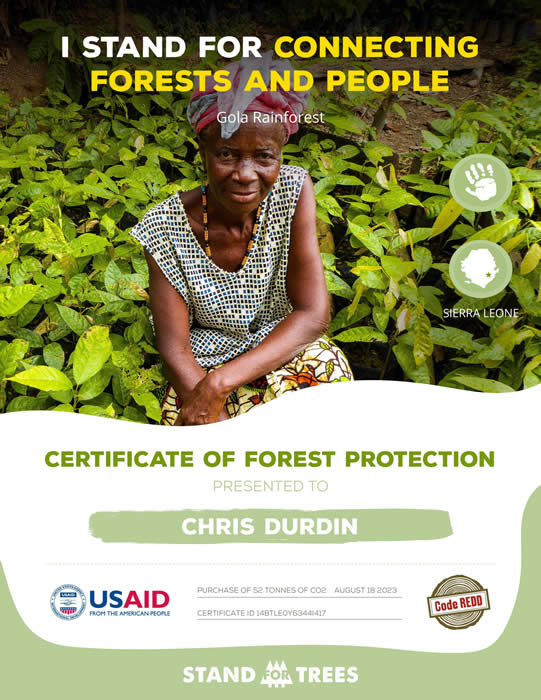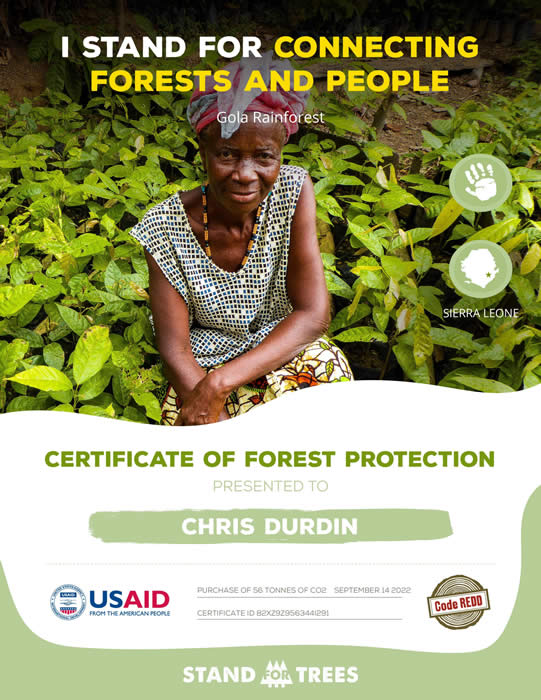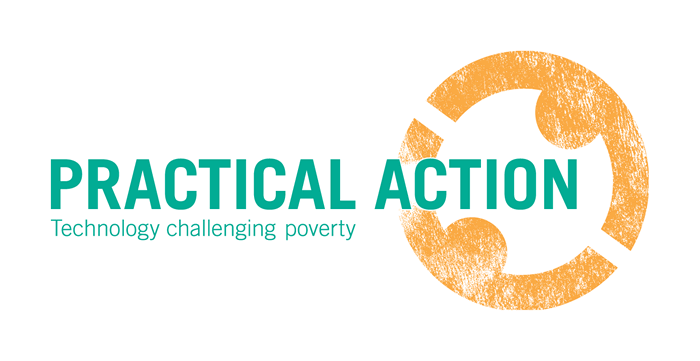Carbon credits
We’re serious about our responsibility to tackle global climate change. That’s why Honeyguide is offsetting its CO2 emissions by buying ‘carbon credits’ for every holiday flight.
Air travel makes up only a small fraction of the UK’s greenhouse gas emissions at present, but that fraction is growing. As an environmentally-minded company, we aim to keep our carbon emissions as low as possible, but we all realise it’s hard to cut our pollution entirely.
Realistically, most of our travellers will fly. We make an annual calculation of the emissions from the flights we use, then buy our carbon offsets, described below.
Carbon offsets
In the early years, Honeyguide supported projects that remove carbon dioxide from the air by replacing polluting technologies with clean ones. These were then the best projects available: the thinking (then) was that 'carbon credits' were bought in projects that prevent the same amount of carbon dioxide from entering the atmosphere.
We now try to support projects that restore nature. Restoring nature has a great ability to sequester carbon, while providing benefits to wildlife and local communities.
Therefore our aim - for a long time, quite a challenge - is to find carbon offsets projects that achieve the ‘gold standard’ in terms of measuring carbon savings (see 'gold standard' below) while also contributing to nature conservation and local livelihoods – the 'win-win-win' of the best projects. Wildlife gains are a key priority for us.
Gola Rainforest in Sierra Leone
Honeyguide's purchases of carbon credits in recent years have supported Gola Rainforest National Park in Sierra Leone. There is more information about Honeyguide's contributions plus various links below. The purchases were for fewer tonnes in recent years, reflecting a smaller programme of holidays since the break during the Covid pandemic.
There is a very good summary of how carbon credits work to support Gola Forest's wildlife and local communities in this BirdLife story from March 2023.
July 2025: Sierra Leone’s Gola Rainforest has been named a new UNESCO World Heritage site for its global importance to wildlife. More information on the RSPB's website here.
For an eighth time, we have bought carbon credits that protect tropical forest in Gola Rainforest National Park in Sierra Leone. The July 2025 purchase was for 43 tonnes of carbon credits through Stand for Trees. The cost was £19/tonne x 43 tonnes = £817. The certificate looks the same as in recent years - that certificate is here.
2024: for a seventh time, we have bought carbon credits that protect tropical forest in Gola Rainforest National Park in Sierra Leone. The September 2024 purchase was for 57.5 tonnes of carbon credits through Stand for Trees (certificate here). The cost was £19/tonne x 57.5 tonnes = £1092.50.
2023: for a sixth time, we have bought carbon credits that protect tropical forest in Gola Rainforest National Park in Sierra Leone. The September 2023 purchase was for 52 tonnes of carbon credits through Stand for Trees (certificate here). The cost was £19/tonne x 52 tonnes = £988.
2022: for a fifth time, we have bought carbon credits that protect tropical forest in Gola Rainforest National Park in Sierra Leone. The September 2022 purchase was for 56 tonnes of carbon credits through Stand for Trees (certificate here).
The fourth purchase, in September 2019, was for 131 tonnes of carbon credits (certificate here).
The third occasion, in September 2018, was a purchase of 105 tonnes of carbon credits (certificate here). Work with camera traps in Gola Forest has given interesting results: more on that and wildlife-friendly chocolate on the RSPB's website here.
in September 2017 we bought 104 tonnes of carbon credits - certificate here - for the same Gola Forest project (thank you to Honeyguide here). This was our second purchase: the first, in July 2016, covered three previous years with 250 tonnes of carbon credits (certificate here).
The project is jointly managed by the RSPB, the Conservation Society of Sierra Leone and the Government of Sierra Leone. There's a video about the project on YouTube here.
The wildlife benefits of protecting this rain forest, an Important Bird Area, are immense. White-necked picathartes is one of the flagship bird species, but there is so much more. Read about the wildlife of Gola Rainforest here.
Though announced in the RSPB's magazine in autumn 2014, the formal establishment of this REDD project (right) took nearly two more years to be up and running.
Martin Harper, formerly the RSPB’s Global Conservation Director (now at at BirdLife International), wrote several blogs on Gola Forest. For the love of... Gola Rainforest (5 Feb 2018) explains more about the RSPB's support for this project. More blogs followed on 'The Impact of Gola Rainforest in Sierra Leone' part 1 (a focus on chocolate) and part 2 (a focus on threatened species, both 15 Feb 2018). Martin visited adjacent Liberia Gola Forest in Liberia (16 Feb 2018).
Marin Harper says: "While the top priority must be to reduce greenhouse gas emissions in absolute terms, our view is that carbon offsetting can be a valuable source of funding to support conservation efforts. So, we support offsetting projects when clear and exemplary biodiversity, carbon and social standards are adopted." Honeyguide agrees: this chimes with the first paragraph above.
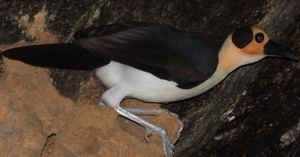
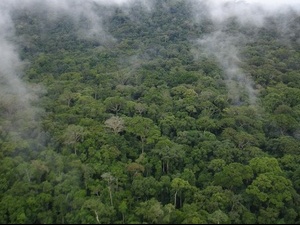
White-necked picathartes (Neil Lambert, RSPB) and Gola Rainforest c/o www.golarainforest.org
Gold standard
There are various schemes on the market to buy carbon offsets, but they vary in quality. We seek carbon offsets that conform to the measurable standards agreed by the industry (Voluntary Carbon Standard or Gold Standard). Other schemes may have carbon benefits but are not clearly measured or measurable.
A particular challenge is that money paid for by some voluntarily 'offsetting' makes no net reduction in emissions: what you’ve paid for, the Government no longer has to.
Carbon offset projects supported through Carbon Clear, 2009-2013
For six years, Honeyguide bought Carbon Credits through Carbon Clear www.carbon-clear.com and we're grateful for their help in this period..
For 2013, we bought Carbon Credits in two places in East Africa. Some of these are again at Kibale National Park reforestation in western Uganda - details under 2012.
One Honeyguider, Margaret Dixey, visited Kibale when her daughter was working on a VSO programme in Uganda. Margaret says, "I am thrilled Honeyguide has chosen to support Kibale. I was very impressed with the work there, particularly the programme for chimpanzees and was very excited to see a family of chimps during a guided walk there."
The other project we are supporting in 2013 is the Kasigau Corridor REDD project in Kenya, west of Mombasa and close to the border with Tanzania. This is preventing deforestation in an area that forms a valuable wildlife corridor linking Tsavo East and Tsavo West National Parks. This REDD project (see right hand column) is the first to gain Voluntary Carbon Standard validation. More information here.
Both projects appeal to us as they combine measurable, verifiable carbon credits with clear biodiversity gains, plus benefits for the local human community.
For 2012, we bought 71 tonnes of Carbon Credits in Kibale National Park reforestation in western Uganda, at a cost of £535. This reforestation project, run in cooperation with the Uganda Wildlife Authority, aims to establish new forest cover over 6,213 ha of degraded land inside the park through the planting of fast growing indigenous tree species. More information here (PDF) There is a brief write-up on Kibale National Park and the reafforestation efforts on Wikipedia here, and a lot more on the long-term sustainable management of the area here: this link takes you to a PDF of the Equator Initiative of the United Nations Development Programme.
This project appeals to us as, for the first time, it combines measurable, verifiable carbon credits with clear biodiversity gains. This '3-legged stool' is our own measure for a good project, in addition to the principles applied by Carbon Clear (see below).
In 2011, Honeyguide bought 30 tonnes of Carbon Credits in a small hydropower project in Turkey. This generates clean hydroelectricity from a small 5MW plant, reducing carbon emissions by displacing fossil fuel use. The project supports the local economy by providing jobs and a sustainable fishery. More information here.
This amount is lower than previous years as we used to predict and buy in advance. For the first few years this was roughly correct, but we over-provided in 2010 because of holidays cancelled due to volcanic ash and an air traffic control strike. This has been taken into account in the latest calculation and we now buy carbon credits retrospectively.
Our project in 2009 and 2010 was to offset our emissions by investing in a project to replace firewood cooking stoves with low smoke LPG stoves in Darfur, Sudan. These reduce carbon emissions, benefit wildlife by reducing wood cutting and provide huge health benefits for families.
 |
For more information on this project click here. In April 2011, Carbon Clear's Darfur Stoves Project made the finals of the Green IT's Carbon Offsetting Scheme of the Year. |
Carbon Clear applies the following principles to all its projects: "They must be efficient. Funds should not be diverted to unnecessary bureaucratic overheads, waste or middlemen. They must have additional, long-term benefits to the communities that undertake them. These range from employment opportunities to the protection of endangered species of plants and animals. They should follow the spirit of the Kyoto agreement. Projects must make pollution reductions over and above their normal level, and it is only this additional benefit to the environment that Carbon Clear supports."


